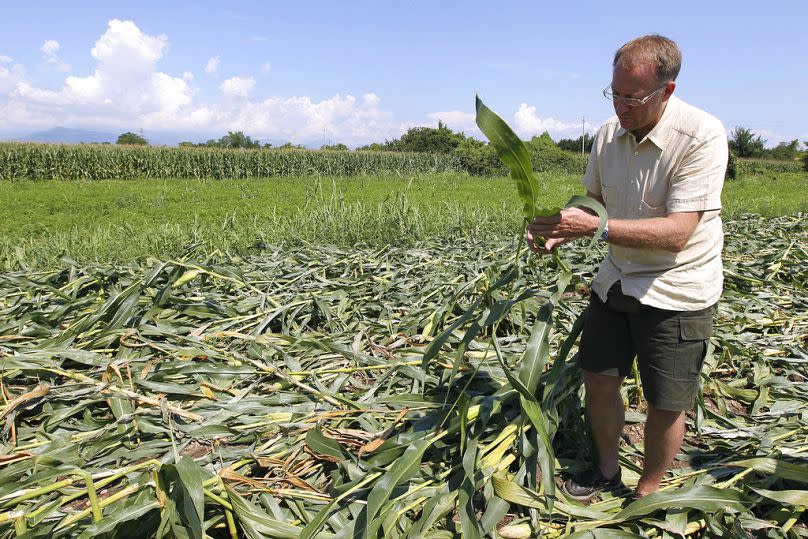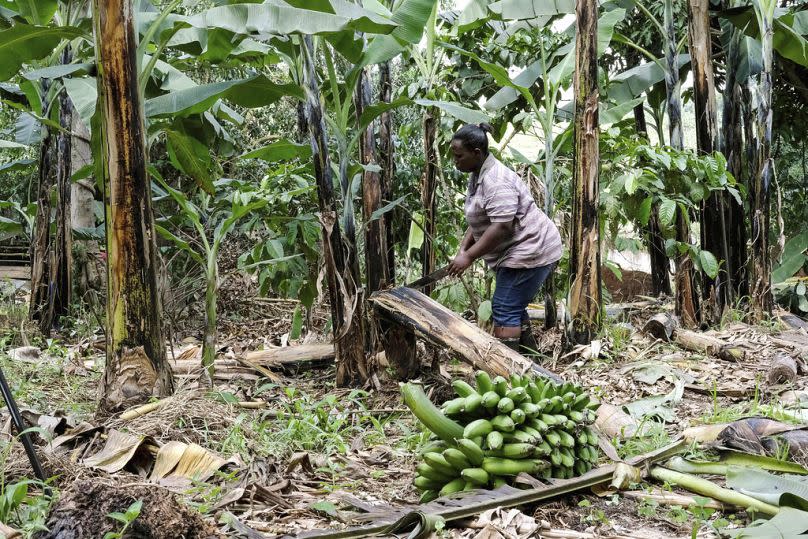Nearly three dozen Nobel laureates have joined more than 1,000 scientists urging members of the European Parliament to embrace science-based gene editing technology.
New genomic techniques (NGTs) “hold great promise for sustainable agriculture, improved food security, and innovative medical solutions,” they write in a petition.
As farmers concerned about the future of food production in the age of climate change, we join this elite group and ask EU policymakers to open their minds to the incredible potential of this technology.
On the surface, we don’t have much in common: One of us grows corn in Nigeria, the other runs an organic vineyard and olive grove in Italy. We live in different places, serve different customers, and face different challenges.
Yet we are united in our belief that NGTs present a tremendous opportunity for farmers in Africa, Europe and everywhere as we seek to grow more food more sustainably.
We cannot afford a repeat of GMO rejection
While the EU’s proposed regulation on NGTs is a welcome step towards understanding and acknowledging the huge benefits that both agriculture and civil society can achieve through the introduction of NGT technology in plant breeding, it is confusing with some gray aspects. Areas that may weaken the effectiveness of the new regulation.
While many European farmers, stakeholders and NGOs are interested in this important innovation and recognize its enormous advantage, others remain skeptical.
The risks are huge. In a global market, failure to implement NGTs in Europe will not only harm European farmers who are trying to do more with less and increase their commitment to sustainability, but will also inadvertently impact African farmers who are dependent on trade with Europe.

In their petition, the scientists made the point clearly, calling on Europeans to “engage with the overwhelming majority of farmers and real experts, not reactionary anti-science lobbyists in the Brussels bubble.”
What we absolutely cannot afford is a repeat of Europe’s disastrous rejection of GMOs, a safe technology that has transformed agriculture in the Americas and much of Asia by allowing farmers to grow more staple foods, fight pests and diseases, and create climate. resistance to crops.
But NGTs present a remarkable science-based opportunity to overcome this age-old dispute.
Technology that can include everyone
With NGTs, crop scientists can speed up the slow traditional breeding process that farmers have used since the dawn of agriculture in the distant past. They get results quickly by pushing existing genes in beneficial directions, one step ahead of old trial-and-error experiments that can take generations to complete.
NGTs can help farmers combat climate change by equipping crops to withstand extremes of heat and cold, as well as drought, floods and diseases. They can help us reduce our dependence on herbicides and pesticides. They can also help us increase our productivity and feed a growing planet.
This technology can also include everyone from large commodity producers to farmers like us.


In Italy, NGTs can help farmers overcome the devastating effects of climate change and the spread of uncontrollable pests and fungi that traditional methods of control and opposition can no longer defeat.
They can also make it easier for organic farmers to produce affordable food and compete in the market by adhering to their basic principles.
In Africa, where agricultural productivity lags the rest of the world, NGTs can help farmers grow better crops that produce more food, feed our neighbors, and push us toward economic self-sufficiency. NGTs will also lead to new and surprising medical breakthroughs.
None of this can happen without European political and scientific leadership.
Chance to hit the reset button
In recent months, various bodies in the EU’s political bureaucracy have considered NGTs’ promises, but their negotiations have mostly created uncertainty.
In 2024, they should try to find a coherent, evidence-based approach that will begin to resolve the issue in favor of this excellent technology.
However, now is the time for national governments to support this regulation.
The proposal is now in the hands of the Council, and it will be the support or rejection of European leaders that will determine whether we want science to be the guiding light in Europe’s transition to more sustainable food systems.
The EU’s policies, of course, set the rules that govern its member states, but their effects extend far beyond borders.
When the EU resisted GMOs at the turn of the century, much of the developing world followed its example and then watched with envy as farmers in the US, Canada, Argentina and Brazil embraced biotechnology and forged ahead, reaping agriculture’s greatest returns ever. that I see.
NGTs give us the chance to hit the reset button and embrace technology that can make agriculture more climate conscious, more sustainable and more efficient.
Onyaole Patience Koku is the co-founder and director of Replenish Farms in Nigeria. Diana Lenzi runs her family’s organic winery, Fattoria di Petrorio, in Tuscany, growing grapes for Chianti Classico and olives for extra virgin olive oil.
At Euronews, we believe that all opinions are important. Contact us at view@euronews.com to send your suggestions or pitches and be part of the conversation.